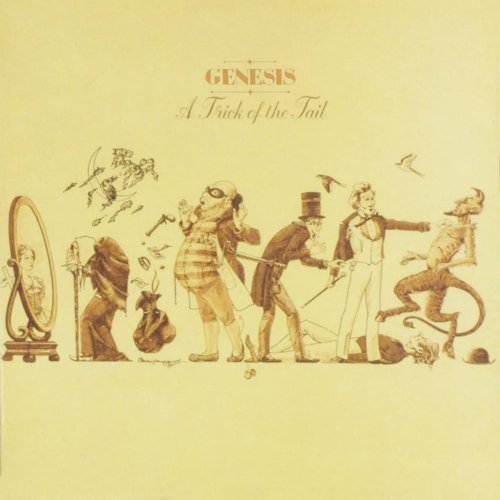

This year, Every Sunday Evening, Album Rock WXYG, The GOAT will be featuring a full album at 8:00 PM from the halcyon musical days of 1976. 1976 was one of the top Years in Album Rock history. Another year of tough choices every week. So many great ones to choose from. After 52 Weeks of featuring so many of the great albums that debuted in 1975, next Sunday we will be moving on to another amazing year of ALBUM ROCK EXCELLENCE, 1976.
We hope you’ll tune in at 8:00 PM, Next Sunday, March 8th, 2026, for “A Trick of the Tail, the seventh studio album by Genesis.

It was released on February 13,1976 on Charisma Records and was the first album to feature drummer Phil Collins as lead vocalist following the departure of Peter Gabriel. It was a critical and commercial success in the UK and US, reaching No. 3 and No. 31 respectively.
Following Gabriel's decision to leave the band, the remaining members wanted to carry on to show they could still write and record successful material, as keyboardist Tony Banks and bassist/rhythm guitarist Mike Rutherford, not Gabriel, were the principal writers of the music. The group wrote and rehearsed new songs during mid-1975 and listened to numerous audition tapes for a replacement frontman. They entered Trident Studios in October with producer David Hentschel to record the album without a definitive idea of who was going to perform lead vocals. After the search for a singer proved unfruitful, Collins was persuaded to sing "Squonk", and the performance was so strong, he sang lead on the rest of the album.
Upon release, critics were impressed by the improved sound quality and the group's ability to survive the loss of Gabriel without sacrificing the quality of the music. The group went out on tour with Collins as frontman and Bill Bruford as tour drummer, and the resulting performances in the US raised Genesis' profile here.
With Collins as their new frontman, the band decided not to pursue the stylish, jagged postmodernism of The Lamb Lies Down on Broadway -- a move that Gabriel would do in his solo career -- and instead returned to the English eccentricity of Selling England by the Pound for its next effort, A Trick of the Tail. In almost every respect, this feels like a truer sequel to Selling England by the Pound than Lamb; after all, that double album was obsessed with modernity and nightmare, whereas this album returns the group to the fanciful fairy tale nature of its earlier records. Also, Genesis were moving away from the barbed pop of the first LP and returning to elastic numbers that showcased their instrumental prowess, and they sounded more forceful and unified as a band than they had since Foxtrot. This is about the sound of the band playing, not individual songs, and it succeeds on that level quite wildly -- to the extent that it proved to longtime fans that Genesis could possibly thrive without its former leader in tow.
‘Tail' really is a wonderful concept album that tells a story and tells it well. It is touching, warm, earthy, wry, confident, and extremely embracing. Reaches right out to you, to all of us. Each song truly dovetails with the next; just as the musicianship of each band member flatters each of them in turn. Genesis bloomed.
There's dazzling rock flourishes mixed with delicate Victorian airs at every step. Everything just comes together.
'Tail' wasn't the first exploration of the group's main theme (English whimsy) but, it is the best. Down-to-earth. And graced by another of the most apropos rock album covers ever. Just astoundingly rich and good.
Tune In and Turn On Sunday evening, March 1st, and every Sunday evening at 8:00 PM for The GOAT'S "The Long Play with Al Neff”.